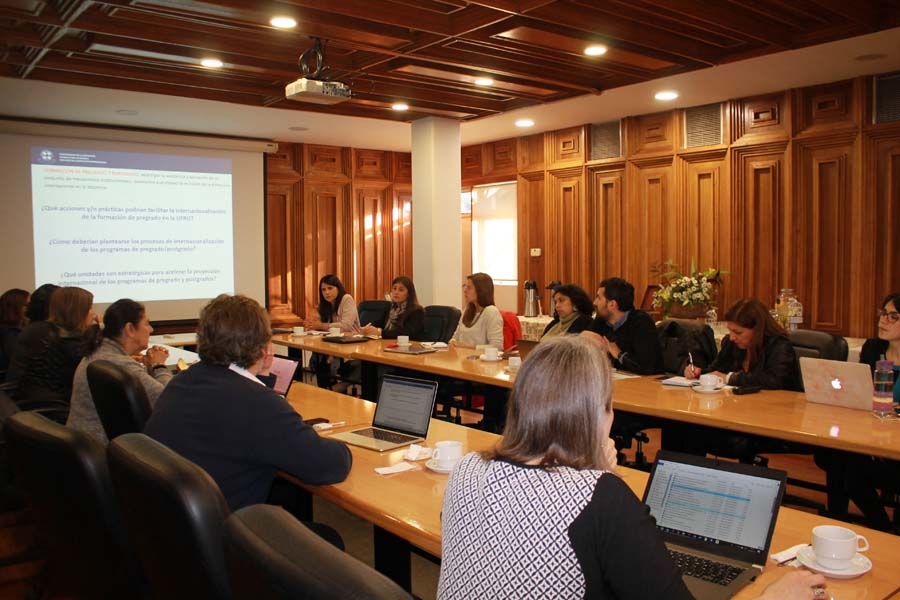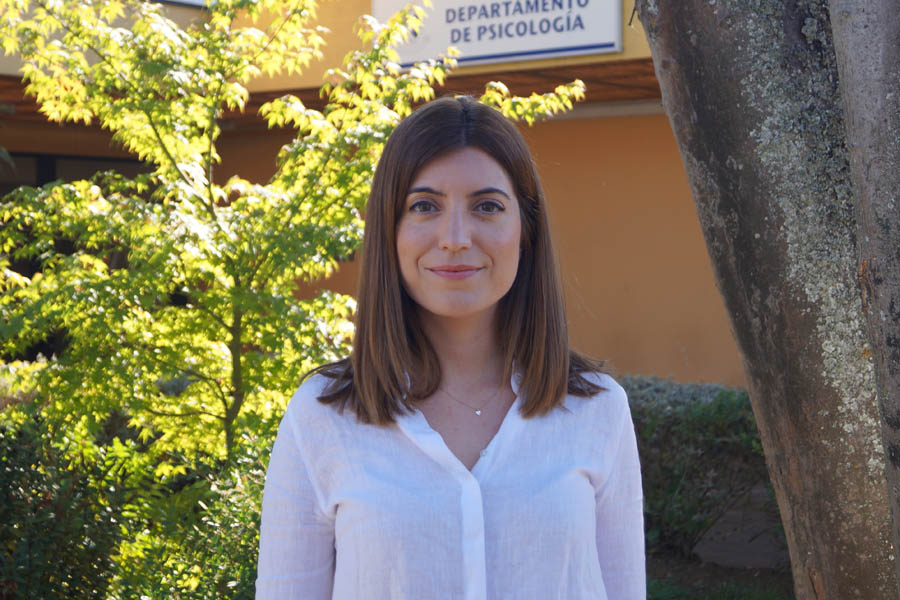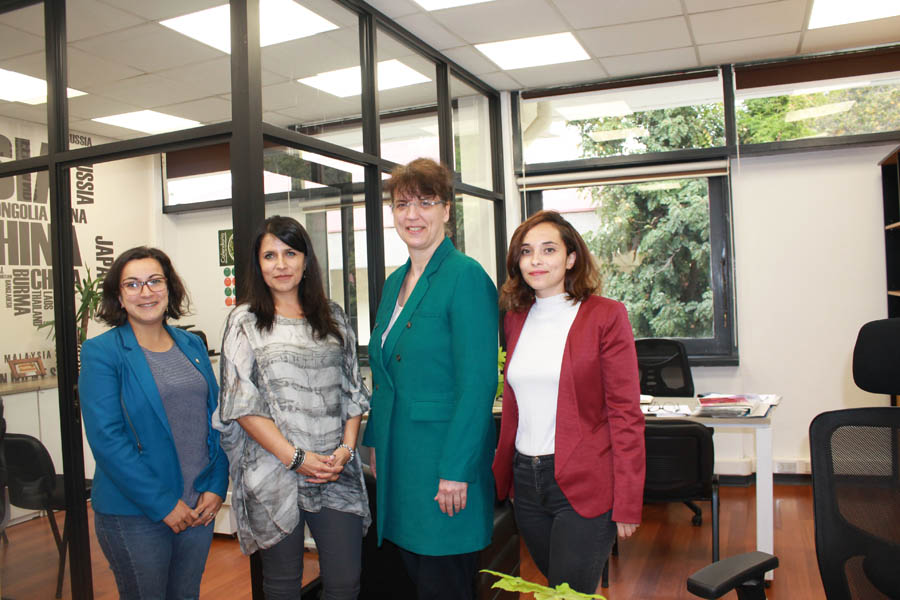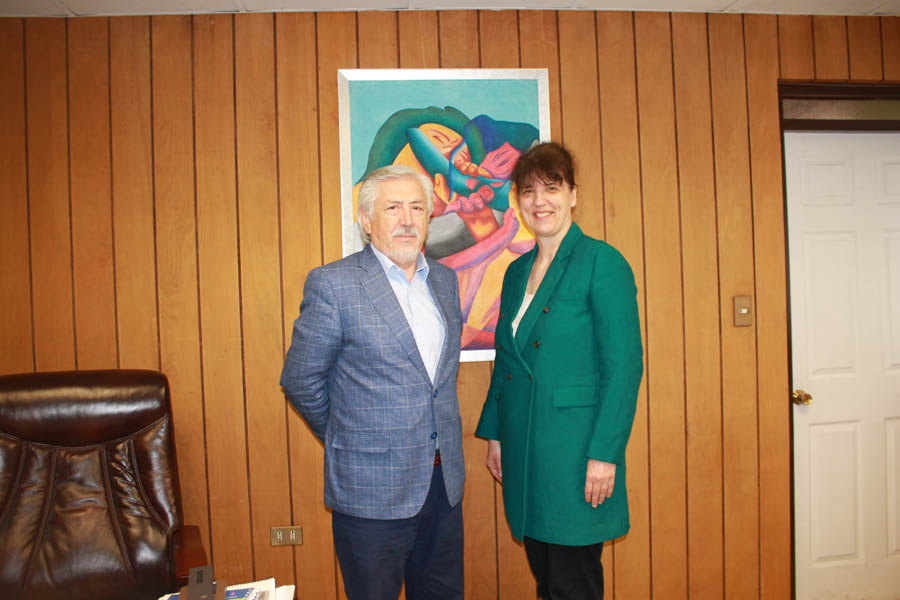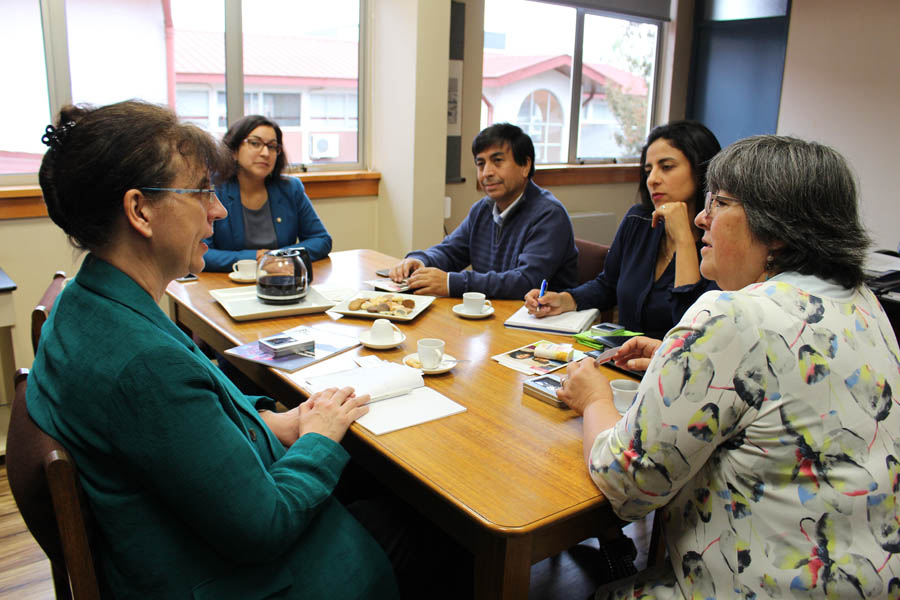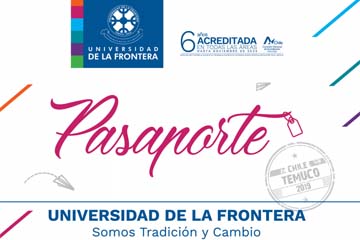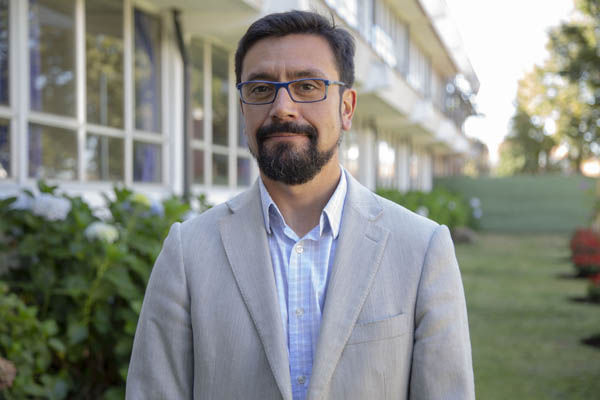|
The Internationalization Committee of the Universidad de La Frontera had its second meeting in order to continue conversations about the main aspects and challenges the internationalization process implies. The meeting was directed by the International Affairs Office, and different academics and professionals were invited to participate. |
The Internationalization Policy of the Universidad de La Frontera contemplates three chapters. It is a basic document that defines the main actions regarding the promotion, strengthening and expansion of international links, in benefit of the university management and the development of its strategic programs, its academics, researchers and students. The Internationalization Committee of the Universidad de La Frontera had its second meeting in order to continue conversations about the main aspects and challenges the internationalization process implies. The meeting was directed by the International Affairs Office, and different academics and professionals were invited to participate. Dr. Berta Schnettler is the director of the committee, which is composed of Dr. Ricardo Herrera, Silvana Pineda, Franklin Valdebenito and Janina Hanswillemenke, and the invited academics and professionals were Dr. María de la Luz Mora, Dr. Marianela Denegri, Dr. Renato Hunter, Solange Martínez, Dr. Enrique Hinostroza, Dr. Pamela Leal, Juan Méndez, Ieva Zebryte, Julia Hasbún, Natalia Caniguán, Antonia Espinoza and Consuelo Sánchez. During the meeting, the participants reviewed some main issues of the Internationalization Policy, collected different opinions and discussed different topics. “These meetings have the purpose of generating a fruitful dialogue that allows to focus on the experiences of the faculties and some of the doctoral programs which have already defined their programs regarding their actions and objectives,” Dr. Schnettler said. Besides, the idea is to think of internationalization as a dynamic, continuous and comprehensive process that involves the university community, with the purpose of contributing to the international and intercultural dimension, in order to increase the institutional capabilities. “There are different aspects we have to work on,” Dr. Marianela Denegri, the director of the Scientific Social Science Nucleus and the Center of Excellence in Consumption and Economic Psychology, said. “I think that one of the essential aspects is the cooperation between graduate programs, through co-tutelage and dual degrees. And we have to intensify the south-south cooperation, which is a challenge we could benefit from in the future. There are a lot of renowned institutions in Latin America and Asia. It’s a great opportunity to establish mutual cooperation for middle-income countries like ours.” POSITIVE EXPERIENCE One of the academic macro units with high productivity in this field is the Faculty of Law and Business. Ieva Zybrite, their director of Outreach and Community Engagement, explained that their internationalization program is in force since 2016. “We suggested certain objectives, targets and monitoring activities, which we reviewed together with our students, employees and academics. That gives us some guidance in our actions and facilitates administrative processes.” This program has three key axes: internationalization at home, short-term undergraduate and graduate courses (professional updating), and the south-south cooperation. “Thus we have identified which are the partner institutions. We are cooperating with the University of Sao Paulo in Brazil, the University ORT Uruguay, with universities of the Pacific Alliance, and, through an entrepreneurship system, we are learning about the Māori Community in New Zealand,” she added. The next meetings of the Internationalization Committee of the Universidad de La Frontera will also take place with representatives of the university community, especially of the faculties, nuclei and doctoral programs, among others, in order to keep working on the accomplishment of the institutional objectives with joint efforts.  Written by: UFRO Communications Office Written by: UFRO Communications OfficeThis email address is being protected from spambots. You need JavaScript enabled to view it. |
|
“Regardless of the country we are analyzing, child abuse is a social problem that affects the life of a great number of children. And it is an important issue because we know that child abuse leads to disadvantages in our society regarding their well-being and their possibilities in the future,” the visiting researcher explains. |
The visit of Dr. Mónica López, a Spanish researcher of the University of Groningen (Netherlands), had several objectives. Her agenda was full of meetings with teachers, undergraduate and graduate students, and members of different organizations, in order to build new networks and to expand research in the field of child protection. Thanks to the program “Attraction of Advanced Human Capital from Abroad, Short-term visit (MEC)” of the National Commission for Scientific and Technological Research (CONICYT) and the work of the International Affairs Office, the Universidad de La Frontera was able to receive the high-level academic and to essentially contribute to the study of child protection systems in Chile, Latin America and Europe. The researcher was not only happy about this visit in the south of the world, but also felt challenged by the work program that has been designed to start with the first comparative analyses in different countries in Latin America. “This is something that really motivates me. The work with the UFRO Department of Psychology has given me the opportunity to receive a lot of feedback on how child protection systems have been applied in different countries on this continent,” she said. CHILD ABUSE Dr. Mónica López is a researcher working in the field of child abuse, which is a constant historic and cultural issue. “Regardless of the country we are analyzing, child abuse is a social problem that affects the life of a great number of children. And it is an important issue because we know that child abuse leads to disadvantages in our society regarding their well-being and their possibilities in the future,” she explains. For the ones who have been working on this issue for several years, the risks for children are latent. “We know that they show higher rates of mental health issues, school failure, drug and alcohol abuse, criminality, unemployment and poor housing conditions. That is why we are not only talking about high personal costs regarding child abuse, but also about social costs,” she added. In order to prevent this kind of situations, the different countries have developed child protection systems and policies that determine that children and families need child protection services and the kind of interventions they require. If the safety of a child is at risk, the social worker of the child protection service can decide to separate it from its family. The number of children who are living apart from their families is estimated at 143 million and the majority of them will be able to grow up in a family environment, whether with their own family members (this is what we call extended family foster care) or in foster or adoptive families. This intervention, called family placement, was one of the main points of interest in the study of Dr. López. “This intervention is the most effective in order to provide emotional stability for the child and shows the best results in adulthood. Nevertheless, an intervention is highly complex and full of challenges. What I am trying to do through my research is to determine how we could develop high-quality fostering programs in order to obtain the best results for the children,” she assured. Due to her international experience, she is always curious to understand how things work in other places, for example how other countries deal with child abuse. Although the countries in Western Europe do share similar principles regarding the need to protect vulnerable children, the child protection systems have been developing in very different ways. “When we study and compare different systems, we can question the policies and practices and compare the effects of different systems in the life of vulnerable children. Although variations exist, usually the argument is that there are two major approaches to respond to child abuse: one focuses on protection and the other on family care. That means that one approach focuses on the child and the other one on the family. This dichotomy is quite useful to identify the philosophic positions in politics or practices through international comparison,” she affirmed. “When you do an international comparison, it is possible to observe that child protection systems do indeed reach from a family-centered approach (for example in the Netherlands) to a protection-centered approach (for example in Chile). It is important to understand that these priorities (or this focus on the child or the family) help to determine the threshold of a country in order to define if a child has been mistreated and how to intervene in the best way. But, of course these two approaches are not static. They can vary over time, due to political and social changes,” Dr. Lopez pointed out.
ADVANCED HUMAN CAPITAL “Child protection is a research field that is actually present in the curriculum of the program and that we need to strengthen in order to create a balance between topics such as criminology and victimology. It is an opportunity to progress in the comparison of child protection systems in the UK, Germany and the Netherlands, which have been examined in detail by Dr. López of the University of Groningen,” Dr. Beatriz Vizcarra of the Department of Psychology, who is also part of the academic committee of the Program, explained.  Written by: UFRO Communications Office Written by: UFRO Communications OfficeThis email address is being protected from spambots. You need JavaScript enabled to view it. |
|
The director of the International Affairs Office of the Universidad de La Frontera and the director of the International Office of the Technical University Braunschweig came together to sign a specific agreement between both institutions. |
About 12500 students are part of the Technical University Braunschweig (TU Braunschweig). It is one of the oldest technical universities in Germany and member of TU9, the Alliance of Leading Universities of Technology in Germany. During her trip to Chile, the director of the International Office of TU Braunschweig, Dr. Ute Kopka, visited five institutions for higher education with which they cooperate, and the Universidad de La Frontera is one of them, since the universities have a mutual framework agreement since 2016. “We are visiting the German Schools and institutions we cooperate with, because we want to increase the number of incoming students for our undergraduate programs in education and to open new possibilities for the exchange of students and academics,” she said. Although this has been a reality for the UFRO for several years, the incorporation of German researchers in the graduate programs and the creation of different possibilities for the mobility of undergraduate students, as well as the growing number of partnerships permitted an important development. This is a specific agreement that strengthens both institutions in this field. “At the moment we have a university teacher at our university who is working in the field of food chemistry and doing research in antioxidants. On other occasions we received Chilean students through the DAAD scholarship program, so we already have experience in this field and the confidence to go on,” the representative of the TU Braunschweig said. Berta Schnettler, the director of the International Affairs Office of the Universidad de La Frontera, thinks that strengthening cooperation strategies that are transversal and holistic gives real sense to the internationalization work of the UFRO. “Our purpose is to strengthen international links through the faculties, our nuclei and the postgraduate programs. And now, we also have the extension of this agreement in order to meet our goal.” NUCLEI AND FACULTIES During her visit, Dr. Kopka had several meetings at the Faculty of Education, Social Science and Humanities, the Faculty of Engineering and Science and the Scientific and Technological Bioresource Nucleus (BIOREN). The German university mentions four pillars that are essential for its development: teaching, knowledge, technology transfer and research. Juan Manuel Fierro, the dean of the Faculty of Education, Social Science and Humanities, said: “Although this German university is a technical university, their programs in the field of education are very similar to ours.” This is why the cooperation regarding methodological and academic aspects and student mobility is an important opportunity. At the Faculty of Engineering and Science Dr. Kopka was received by the vice dean, Elena Oliveros, the director of the Outreach and Community Engagement Office of the faculty, Iván Velásquez, and the coordinator for internships, Gabriela Reyes. “It is essential for us to strengthen these links, since one of the main objectives of our Plan for Strategic Development is internationalization,” the dean claimed. In this context, Gabriela Reyes commented: “We want the number of students who have the opportunity to life an experience of student mobility (student exchange and internships) to grow and the TU Braunschweig offers an excellent opportunity, since their faculties are linked to the fields of engineering, computer science, mechanics, electricity and electronics.”  Written by: UFRO Communications Office Written by: UFRO Communications OfficeThis email address is being protected from spambots. You need JavaScript enabled to view it. |
|
|
The Rector´s Office and the Department of Analysis and Institutional Development created and designed the “UFRO Passport”, a brochure academics, researchers and students can use whenever they need to present our achievements and the essence of the daily work of our university. It is available as a hard copy or as a digital download, in Spanish and English.
 Written by: The Rector’s Office, Written by: The Rector’s Office,Department of Analysis and Institutional Developmente |
|
Research performance, innovation outputs and societal impact are the three different sets of indicators the SCImago Institutions Rankings evaluate for the international ranking of academic and research-related institutions. |
It is the most prestigious indicator for scientific productivity at the international level. SCImago published its ranking 2019 and ranks the Universidad de La Frontera in 7th place at the national level and in 41th place in Latin America. Regarding 2018, our institution for higher education climbed 5 positions at the national level and in the Latin American ranking it climbed 18 positions, thanks to the processes of constant improvement which the Universidad de La Frontera included in its institutional development plans and which were also one of the facts that led to the new accreditation last year, for 6 years in all areas. For Dr. Renato Hunter, the Vice-Rector for Research and Graduate Studies, one of the main factors for the good position of the Universidad de La Frontera during this last decade was its research performance, what leads to new challenges. “We need to establish a vision that focuses on the future regarding our indicators, especially when it comes to better mechanisms of internationalization and cooperation and, at the same time, to the networks that drive us towards state of the art scientific and technological development at the international level,” he said. The SCImago Institutions Rankings analyze 12 objective variables combined in three different sets of indicators: Research performance (50%), innovation outputs (30%) and societal impact (20%). This year, more than six thousand universities and research centers all over the world have been evaluated. To see the rankings, please go to: https://www.scimagoir.com/rankings.php.  Written by: Vice-Rectorate for Research and Graduate Studies Written by: Vice-Rectorate for Research and Graduate Studies |





